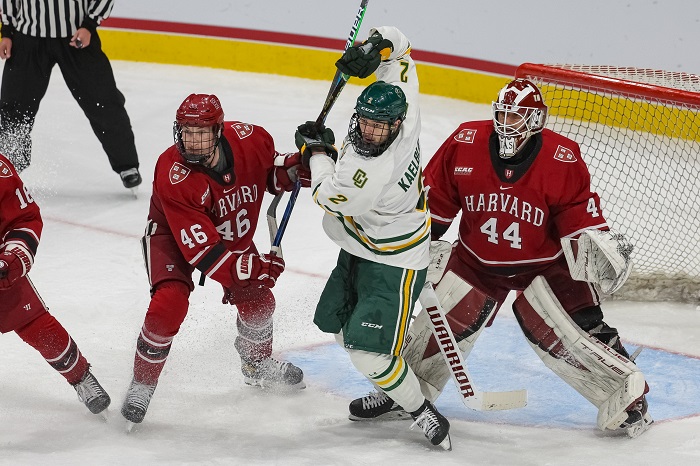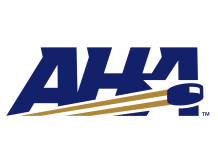
Each week during the season, we look at the big events and big games around Division I men’s college hockey in Tuesday Morning Quarterback.
Ed: Next to the Frozen Four, the weekend of conference championships is probably the best one of the year in D-I men’s college hockey. And this past weekend didn’t disappoint. Several NCAA bids were on the line, teams were watching to see if they were in or out of the bubble, and three championship games went to overtime.
Well, actually … one went to overtime twice.
While most folks are familiar by now with the restart of the Minnesota State-Bemidji State CCHA championship game after it was found that what was ostensibly the game-winning goal had been tucked under the frame of a lifted net, I think it’s worthwhile to take a moment to commend the conference for how the situation was handled.
In the postgame press conference, CCHA commissioner Don Lucia took the podium first and explained that he and officials had found out that there were other views that were not on the officials’ replay that showed that it was not a good goal. Lucia said that players were still on the ice when that was found and the officials were still on site and were called to review the video.
Lucia also met with coaches Mike Hastings and Tom Serratore to explain the situation and the game resumed with the Mavericks winning the Mason Cup.
Reports that circulated while the game was being restarted made it sound like a chaotic fiasco, but in hindsight and with more detail it sounds like Lucia, the CCHA, and the officiating crew all handled it correctly.
But also, Jim, I think it shows us that video replay and how it’s conducted – and even the rules for how a game ends – need some refinement.
Jim: I agree with many of the points you made here, Ed.
I think referees in college sports – maybe even more so than the professional level – live by the mantra of “get it right.” In the end, that’s what happened on Saturday in the CCHA, even if the process itself felt flawed.
Ideally, this would have been viewed by a video replay official immediately after the goal was scored as all postseason goals are to be reviewed. That was the flaw in the process and the league’s attestation that the video angle that showed proof that the goal wasn’t properly scored was missing is concerning at a minimum.
This is the first CCHA tournament since last year’s realignment. That means everything was really being done for the first time. Still, there is enough empirical knowledge available from other conferences on how to operate a video review system and make sure the officials have access to every possible camera angle.
I will go back to your original point – they got it right. For the student-athletes that’s what matters. But could the PR nightmare of how it was handled have been avoided? I say yes.
Ed: I don’t want to be overly critical of this from a public relations perspective, because a lot of that PR nightmare was driven by speculation on social media. The league tweeted a notice at 9 p.m. CT on Saturday that the goal was under review, but that came 25 minutes or so after it was thought that Josh Groll had won the game at 3:02 of overtime.
So a statement – at least outside the arena – was a bit late in coming, but I want to be sure the heat on this is not on Dominic Hennig, who has done an excellent job as the CCHA’s director of strategic communications and brand advancement, or in plain language, the league’s PR guy. It seems he got the word out as quickly as he could. I’ll also give credit to Lucia for taking responsibility and taking some heat in this.
What I will criticize is something you mentioned, and that is the process. Video review more often than not does lead to getting things right, but the implementation of it across college hockey is inconsistent. Just the admission that not all camera angles were available to officials tells me that there are issues. The NCAA and the six conferences need to set standards that will ensure that every camera in the building is available to officials. Within conferences, there needs to be uniformity on software and equipment, something not all conferences have.
This is also a rules update year, and if there wasn’t already enough controversy over video, this has assured that the rules committee will take a serious look at making replay rules and procedures better. They will be feeling the heat.
But let’s turn to the NCAA regionals. Last season, the men’s D-I committee had the unenviable job of choosing a field of 16 without the mathematical certainty of the PairWise Rankings. This year, they had the rankings and created a bracket that maintains integrity while avoiding first-round intraconference matchups. And they seem to have done the best possible job in trying to maximize attendance.
With the field chosen, let’s talk first-round No. 1 vs. No. 4 upsets. Every season there seems to be at least one. If there’s one upset you’d pick as most likely, which is it?
Jim: This year’s 1 vs. 4 matchups make it difficult to find the upset. While I’d like to pick UMass Lowell over Denver, I’m not sure the River Hawks are ready to slow down the Pioneers offense enough to pull off a win.
Harvard is playing great hockey right now, but Minnesota State doesn’t feel like a team ready to concede a loss in the opening round.
So if I had to pick one No. 4 seed that can pull off the upset, I’d have to go for Northeastern. The main reason is goaltender Devon Levi, who, in my opinion, is the best of all the great goaltenders in college hockey this year. He’s good enough to stop a team like Western Michigan and possibly win a game by a 1-0 or 2-1 score.
What are your thoughts on this one? And do you maybe see another team that might be a real dark horse in this tournament?
Ed: I think you’re right about Northeastern being the No. 4 with the best chance to upset. Levi has been superb.
As far as another dark horse? It’s hard to pick one when there are probably eight to 10 teams with a legitimate shot at the national championship.
A couple of weeks ago, Minnesota Duluth looked like it was in danger of not making the tournament. But the way Scott Sandelin’s team is playing now, and with Ryan Fanti putting up the same sort of numbers that UMD saw with Hunter Shepard in its two recent championships, I think it would be a mistake to overlook the Bulldogs.
I’ll toss in one other: Quinnipiac. The Bobcats have been criticized – and in the PairWise penalized – all season for having a weak schedule. But if they can get to the regional finals against odds-on favorite Michigan, their smothering defense and astronomical goaltending of Yaniv Perets may prove them to be one of the teams best suited to get in the way of the Wolverines.
There was some discussion in the Twitterverse about which regional is the “region of death,” the one most difficult to get out of. I think the Albany regional with Minnesota State, Harvard, North Dakota, and Notre Dame is it. The three highest seeds all are good enough to win the national championship, and Harvard has been finding ways to win.
Is there another region you’d select, at least as a runner-up to Albany?
Jim: I do think this weekend will either shut up a lot of Quinnipiac detractors or prove them right. The Bobcats certainly didn’t have some shrinking violet of a schedule outside of the ECAC, but this was the most down that ECAC conference has felt in a long time.
I think in terms of difficult regions, yes, Albany is the true “region of death.” But I also look at Worcester as one that could be difficult for the top teams. Western Michigan, which has qualified for the NCAAs just three times in 25 years, they will face Northeastern and possibly UMass or Minnesota.
The Gophers are a powerhouse but couldn’t pull off the win in the B1G title game and now have to take on red-hot UMass. The two bottom teams in the region will feel somewhat at home with their local fan bases. That’s pretty difficult to handle and I wouldn’t be surprised if either three seed UMass or four seed Northeastern escape this region to the Frozen Four.
It should be a great weekend of hockey, Ed. Enjoy!


